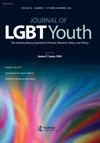Bullying, depression, and parental acceptance in a sample of Latinx sexual and gender minority youth
IF 1.8
Q1 SOCIAL SCIENCES, INTERDISCIPLINARY
引用次数: 10
Abstract
Abstract Sexual and gender minority (SGM) youth of color—in particular Latinx SGM youth—experience higher incidents of bullying compared to heterosexual and cisgender White youth. These disparities oftentimes explain increased negative mental health outcomes, such as depression. Parental acceptance may be a particularly important buffer to the effects of bullying on negative mental health outcomes among Latinx SGM youth. In a sample of 1,005 Latinx SGM youth (ages 13-17), we assessed: (a) the prevalence of parental acceptance and bullying, (b) the influence of bullying on depression, and (c) whether the relationship between bullying and depression was moderated by parental acceptance. Results showed that, on average, Latinx SGM youth reported rarely experiencing parental acceptance, frequently experiencing symptoms of depression, and frequently being bullied. Findings revealed that parental acceptance and bullying were significantly related to depression. Furthermore, there was no interaction between parental acceptance and bullying on depression. Findings have implications for how different Latinx cultural values may be further considered to better understand Latinx SGM youth’s perception of their parental figure’s acceptance of their sexual and gender identity and its role on bullying and depression.拉丁裔性和性别少数群体青少年的欺凌、抑郁和父母接受程度
摘要与异性恋和顺性别白人青年相比,有色人种的性少数群体和性别少数群体(SGM)青年,尤其是拉丁裔SGM青年,遭受欺凌的事件更高。这些差异往往解释了负面心理健康结果的增加,比如抑郁症。父母的接受可能是一个特别重要的缓冲因素,可以缓解欺凌对拉丁裔SGM青年负面心理健康结果的影响。在1005名拉丁裔SGM青年(13-17岁)的样本中,我们评估了:(a)父母接受和欺凌的流行率,(b)欺凌对抑郁症的影响,以及(c)父母接受是否调节了欺凌和抑郁症之间的关系。结果显示,平均而言,拉丁裔SGM青年很少经历父母的接纳,经常出现抑郁症状,经常被欺负。研究结果显示,父母的接纳和欺凌与抑郁症有显著关系。此外,父母对抑郁症的接受和欺凌之间没有交互作用。研究结果表明,如何进一步考虑不同的拉丁裔文化价值观,以更好地理解拉丁裔SGM青年对其父母形象接受其性和性别认同的看法,以及其在欺凌和抑郁中的作用。
本文章由计算机程序翻译,如有差异,请以英文原文为准。
求助全文
约1分钟内获得全文
求助全文
来源期刊

Journal of LGBT Youth
SOCIAL SCIENCES, INTERDISCIPLINARY-
CiteScore
5.40
自引率
8.30%
发文量
30
期刊介绍:
The Journal of LGBT Youth is the interdisciplinary forum dedicated to improving the quality of life for lesbian, gay, bisexual, transgender, and questioning youth. This quarterly journal presents peer-reviewed scholarly articles, practitioner-based essays, policy analyses, and revealing narratives from young people. This invaluable resource is committed to advancing knowledge about, and support of, LGBT youth. The wide-ranging topics include formal and non-formal education; family; peer culture; the media, arts, and entertainment industry; religious institutions and youth organizations; health care; and the workplace.
 求助内容:
求助内容: 应助结果提醒方式:
应助结果提醒方式:


